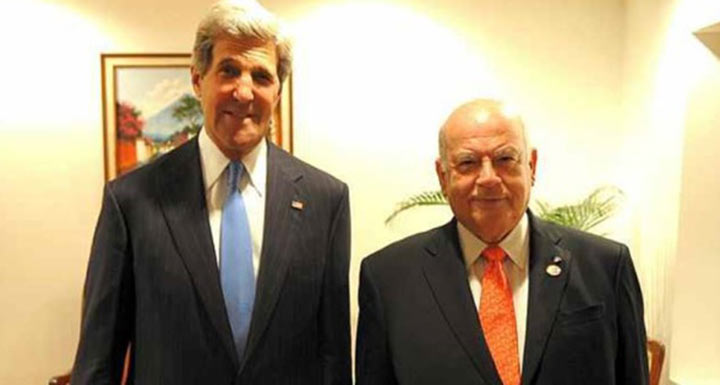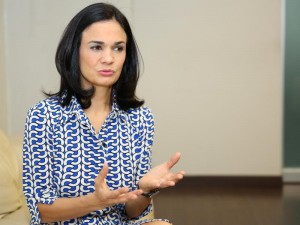
Two blocs face off in Summit of Americas 2015
HAVANA — The secretary general of the Organization of American States, José Miguel Insulza, said on Thursday (Sept. 4) that “there is no legal reason” why Cuba should be prevented from attending the Summit of the Americas in April 2015 if Panama, as the host country, decides to formally invite it.
Significantly, Insulza made that statement in Washington while participating in a conference on the “Challenges for the Hemisphere 20 Years after the First Summit of the Americas.”
“Forty years of isolating Cuba have not worked. It is time to try something else,” Insulza said.
U.S. Secretary of State John Kerry met on Tuesday, also in Washington, with Panama’s Vice President and Foreign Minister, Isabel de Saint Malo, to deal with the preparations for the Summit and other relevant topics. What Kerry told Ms. Saint Malo about Panama’s invitation to Cuba was not reported, but could be assumed.
However, in a press briefing, the State Department’s spokeswoman, Jen Psaki, said categorically that the U.S. government is against Panama’s decision to invite Cuba to the Summit.
Many believe that U.S. opposition is so strong that such an invitation could provoke Washington into shunning the continental gathering, which would cause its virtual extinction.
That is why Panama might take a long time before sending its formal invitation to the Cuban government, now that the isthmus nation is being subjected to strong diplomatic pressures to do the opposite.
On one side are the United States and Canada; on the other are most Latin American and Caribbean countries, which favor Cuba’s representation in the continental forum. At least one dozen of those nations have announced that they will not attend the meeting if Cuba is again excluded.
This way, the small Caribbean island, much beyond its real importance in the region, seems to be the apple of discord in this affair, due both to the United States’ blind obstinacy and the other countries’ defense of its national sovereignty.
A simple look at the political events that have marked the first years of this century in Latin America and the Caribbean show that the current governments do not wish to — and maybe cannot — do away with their sovereign prerogatives.
In short, three scenarios are possible as a result of the confrontation between the continent’s northern and southern blocs.
First: The United States manages to bar an invitation to Cuba. This would not prevent but stimulate the total failure of the Seventh Summit of the Americas, which would be held with the absence of a large number of chiefs of state and end without a consensus.
Second: Unable to bar an invitation to Cuba and change the relationship of forces in Latin America and the Caribbean, the United States does not attend the Summit, thus decreeing its demise.
Third: The U.S. accepts Cuba’s presence, making a radical change in its relationship with that country and the rest of the countries in the southern region.
If Washington opts for either of the two first choices, it will isolate itself and concentrate only in the promotion of bilateral relations with countries that would hardly accept a submissive role in the style of the 20th Century.
The decision to “dance alone” would probably be unfavorable to the countries in the northern bloc, at a time when the practices of cooperation and integration among Latin American countries are becoming rooted.
This is also a time when economic relations between the southern bloc and powers like China and Russia can be advantageous to all.
*****
Statement by Panama’s vice president before meeting with Kerry
UPDATE: Statement to the media made by Panama’s Vice President and Foreign Minister Isabel de Saint Malo on Tuesday (Sept. 2) before her meeting with U.S. Secretary of State John Kerry, as translated by the State Department.
It is very nice to be here in this first official visit to the United States. Relations between Panama and the United States have been very strong for many, many years. We’ve worked together through some very difficult times for Panama, and the United States has always been supportive, and we’re very grateful.
We’re here, as the Secretary has said, to discuss some issues of mutual interest. President [Juan Carlos] Varela’s foreign policy priorities are based, one, in Panama as a country that promotes dialogue, Panama as a country that promotes consensus building, Panama as a country that helps build bridges among countries. It is a role that we have played before in Panama’s history and that we hope to play again. And also we wish to push our foreign policy in terms of the global development agenda, which is very closely tied with President Varela’s domestic priorities for Panama also.
So, we are very happy to be here. These two foreign policy priorities, of course, will be important in the hosting of the Seventh Summit of the Americas to be held in Panama next year in April, and we hope to have a successful summit. We expect President Obama to be present and the rest of the leaders of the region, and we do hope to be able, during the summit, to discuss issues of importance and of relevance to the region in terms of development, in terms of migration, in terms of other issues, such as energy, and of course, in terms of the priorities of the summit, such as democracy and human rights.
It is very nice to be here, and we thank you for hosting us.


